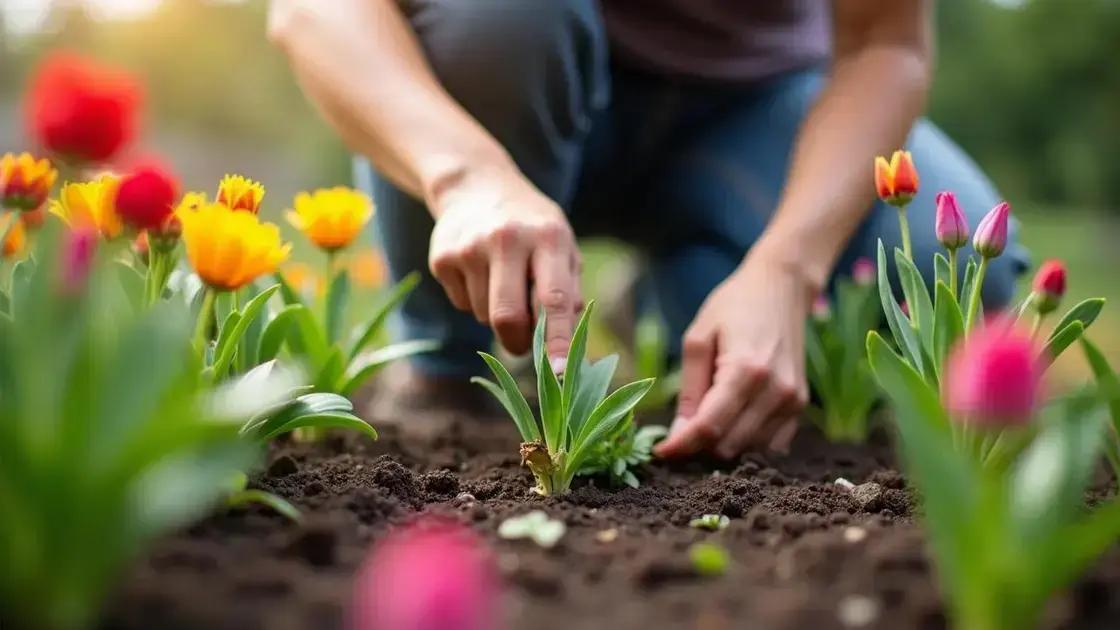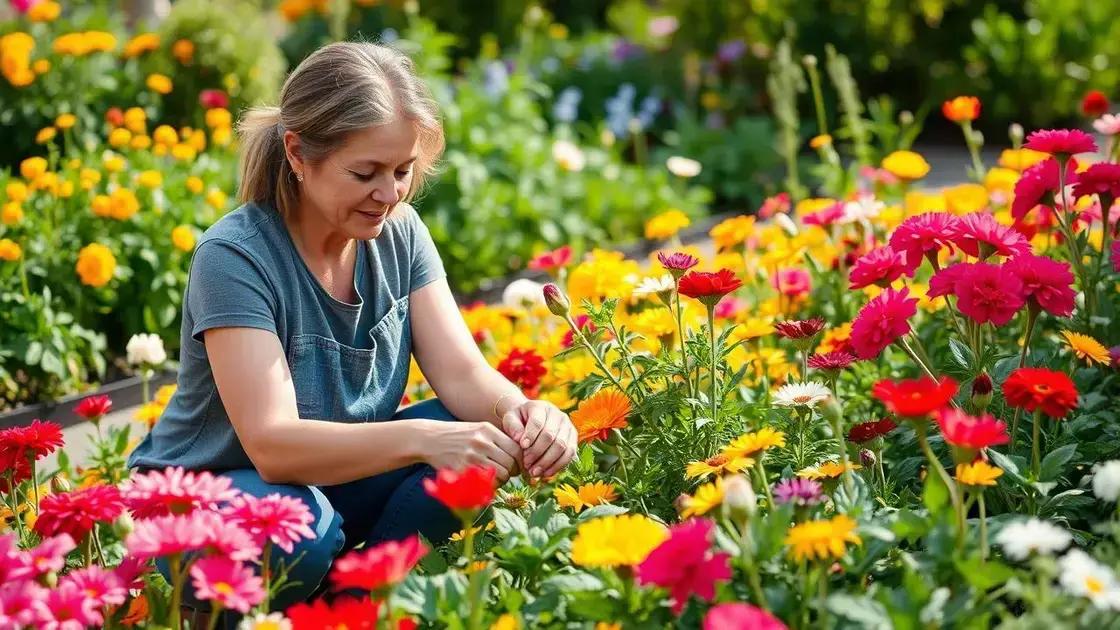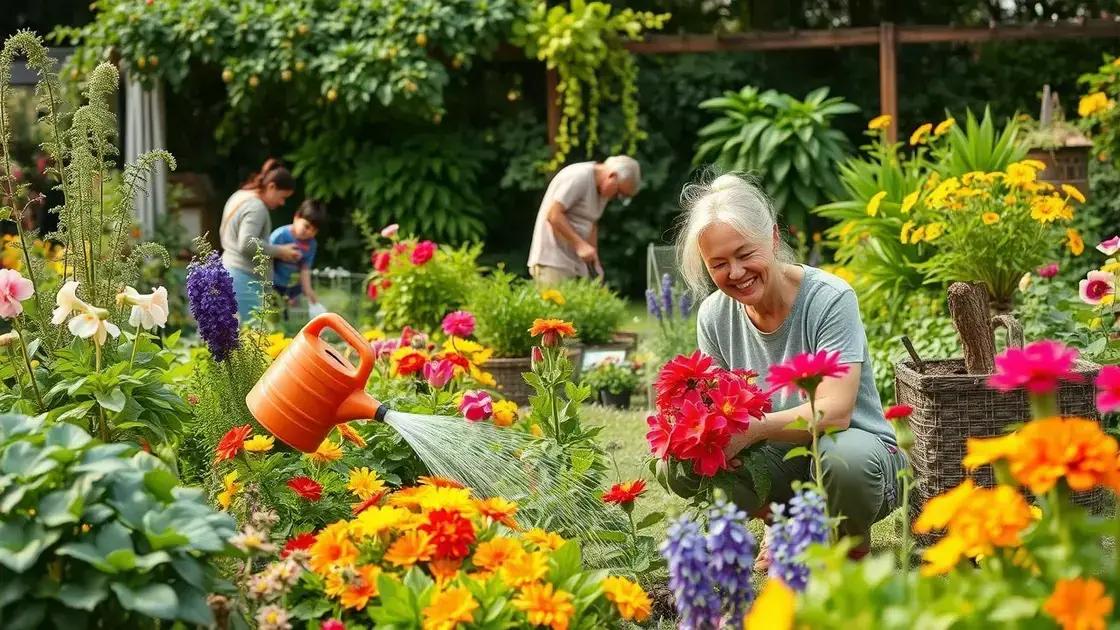The role of gardening in promoting physical and mental health includes benefits such as improved cardiovascular health, stress relief, enhanced mood, and fostering community connections, making it a valuable activity for overall well-being.
Gardening is more than just a hobby; it plays a crucial role in promoting physical and mental health. Engaging in gardening can lead to improved physical health as it encourages exercise and outdoor activity. Moreover, it significantly enhances mental health by providing relaxation and reducing stress levels. In this blog post, we will delve into the multiple dimensions of how gardening impacts our health positively, exploring its benefits and practical ways to incorporate gardening into everyday life.
Introduction to Gardening and Health Benefits

Gardening is a powerful way to improve both physical and mental health. It involves planting, nurturing, and maintaining plants, which not only beautifies the environment but also greatly benefits our well-being. By actively engaging in gardening, individuals can enhance their quality of life in several significant ways.
The Connection Between Gardening and Health
Various studies have shown that spending time in green spaces, whether at home or in community gardens, is linked to lower stress levels. Gardening encourages outdoor activity which is essential for a healthier lifestyle. Regular participation in gardening exercises the body, builds strength, and increases flexibility as it often involves digging, planting, weeding, and watering.
Physical Activity and Its Benefits
Gardening is a form of physical activity that can improve cardiovascular health. It raises the heart rate and helps burn calories, similar to moderate-intensity workouts. This form of exercise is accessible for many people, making it an excellent way to stay active without needing a gym membership.
Stress Reduction and Mental Clarity
Moreover, engaging with nature has been shown to reduce feelings of anxiety and depression. Gardening allows individuals to practice mindfulness, focusing their thoughts on nurturing plants and connecting with the beauty of nature. This shift in focus can bring a sense of peace and clarity.
Social Interaction and Community Building
Many gardening practices involve community involvement. Community gardens, for example, provide opportunities for social interactions which are vital for mental health. Working alongside others can foster friendships, improve social skills, and promote a sense of belonging.
In summary, gardening is a holistic activity that supports both physical and mental wellness, making it a valuable practice for individuals looking to enhance their health in an enjoyable and fulfilling way.
Physical Health Benefits of Gardening

Gardening provides numerous physical health benefits that can lead to a healthier lifestyle. By engaging in gardening activities, individuals can improve their overall fitness and well-being. Here are some of the key physical health benefits associated with gardening:
Improved Cardiovascular Health
When you garden, you engage in physical activities like digging, planting, and weeding, all of which elevate your heart rate. This increase in heart rate can promote better cardiovascular health, lowering the risk of heart disease and improving circulation.
Enhanced Strength and Endurance
Gardening often requires lifting, bending, and stretching, which can enhance your muscle strength and endurance. As you regularly use different muscle groups, you increase your core strength and flexibility. This variety in motion helps maintain bodily health.
Weight Management
Gardening is also a great way to burn calories. Depending on the type of gardening tasks you engage in, a person can burn between 200 to 600 calories in an hour. This can contribute to weight management and help individuals achieve or maintain a healthy weight.
Improved Coordination and Balance
Activities such as hoeing, planting, and pruning in the garden help improve hand-eye coordination and balance. These physical skills are essential for daily activities and can help reduce the risk of falls, especially in older adults. Regular gardening can thus help maintain mobility and independence.
In addition to these benefits, spending time outdoors while gardening exposes you to sunlight, which is a natural source of vitamin D. This vitamin is essential for bone health and a well-functioning immune system. Gardening, therefore, not only promotes physical activity but also overall health in a holistic way.
Mental Health Advantages Through Gardening

Gardening not only promotes physical health but also offers remarkable benefits for mental health. Engaging with nature through gardening can lead to improved emotional well-being and a reduction in mental health issues.
Stress Relief and Relaxation
Gardening allows individuals to escape the hustle of daily life. Spending time in a garden can lead to a significant decrease in stress levels. The act of nurturing plants and being surrounded by the beauty of nature promotes a sense of calm and relaxation.
Boosting Mood and Happiness
Research has shown that gardening can boost mood levels, especially among individuals suffering from anxiety and depression. The pleasure of watching plants grow and thrive can generate feelings of accomplishment and joy. This positive reinforcement helps uplift spirits and improve overall happiness.
Mindfulness and Focus
Gardening encourages mindfulness, which is the practice of being present in the moment. When you garden, you engage all your senses—seeing, hearing, smelling, and touching. This attention to detail helps quiet the mind, reducing worries and enhancing mental clarity.
Creating Community Connections
Gardening can also foster social connections among community members. Participating in community gardens or gardening groups creates opportunities for interaction and support. Building relationships with others can provide emotional support, combating feelings of loneliness and isolation.
By providing these mental health advantages, gardening serves as a therapeutic outlet that enriches lives. It allows individuals to connect with their environment, themselves, and others around them.
Tips for Integrating Gardening into Your Daily Life

Integrating gardening into your daily life can be simple and rewarding. Here are some practical tips to help you start and maintain a gardening routine:
Start Small
Begin with a few pots or a small garden bed. This will make gardening more manageable and less overwhelming. As you gain experience, you can expand the size of your garden gradually.
Create a Schedule
Set aside specific times during the week for gardening. Consistent routines help make gardening a regular part of your life. Whether it’s watering plants once a week or spending time each weekend planting new seeds, having a schedule can keep you motivated.
Choose Easy-to-Grow Plants
When starting a garden, select plants that are easy to care for. Consider herbs like basil or flowers like marigolds. These plants often grow well and require less maintenance, making gardening enjoyable.
Use Gardening as a Family Activity
Invite your family or friends to join you in gardening efforts. Working together can strengthen relationships while also making gardening fun. Children can learn about nature and responsibility by caring for plants.
Incorporate Gardening Into Daily Tasks
Combine gardening with everyday activities. For instance, you can water plants while taking a break during work or walk through your garden after meals. These small actions can make gardening feel more integrated into your routines.
Join Local Gardening Groups
Consider joining local gardening clubs or community gardens. These groups can provide support, resources, and friendships. Connecting with others who share your interests can enhance your gardening experience.
By implementing these tips, you can easily make gardening a delightful part of your daily life, helping to promote both physical and mental well-being.
In conclusion, the transformative power of gardening
Gardening plays a pivotal role in promoting both physical and mental health. By engaging in gardening activities, individuals not only improve their strength and endurance but also experience stress relief and enhanced mood.
Whether you have a small balcony garden or a sprawling backyard, there are countless ways to integrate gardening into your daily life. From community engagement to personal fulfillment, the benefits of gardening extend far beyond the physical act of planting.
By adopting simple tips and making gardening a consistent part of your routine, you can unlock its full potential. Embrace this green hobby to enrich your well-being, connect with nature, and foster community relationships.
Ultimately, gardening is not just about growing plants; it’s about growing healthier and happier lives.
FAQ – Frequently Asked Questions about Gardening and Health Benefits
What are the physical health benefits of gardening?
Gardening improves cardiovascular health, increases strength and endurance, aids weight management, and enhances coordination and balance.
How does gardening benefit mental health?
Gardening helps reduce stress, boosts mood, encourages mindfulness, and fosters social connections through community gardening.
How can I start a gardening routine if I have limited space?
You can start with container gardening on a balcony or small indoor plants, which require less space but still provide health benefits.
What plants are easy for beginners to grow?
Beginner-friendly plants include herbs like basil, flowers such as marigolds, and vegetables like radishes, which are generally easier to care for.
How often should I tend to my garden?
Set a schedule that works for you, aiming to check on your garden at least once a week for watering and maintenance.
Can gardening be a family activity?
Absolutely! Gardening can be a fun and educational family activity, fostering teamwork and responsibility among family members.













